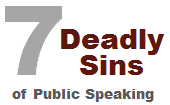
Is fifth grader Dalton Sherman the next Barack Obama?
Of course, it’s far too early to tell, but that’s how he refers to himself in an interview on the Ellen show, where my wife first saw this extraordinary young man who can teach us all something about inspirational speaking.
This article reviews the keynote address at the Dallas Independent School District (D.I.S.D.) Teachers’ Conference delivered by a 5th grade student: 10-year-old Dalton Sherman from Charles Rice Learning Center.
This article is the latest in a series of video speech critiques which help you analyze and learn from excellent speeches.








































